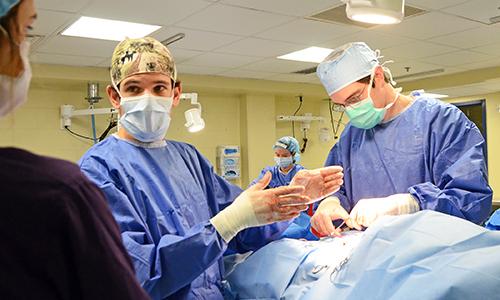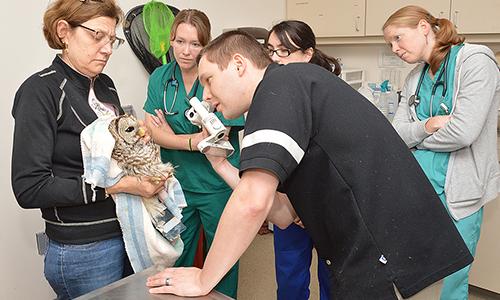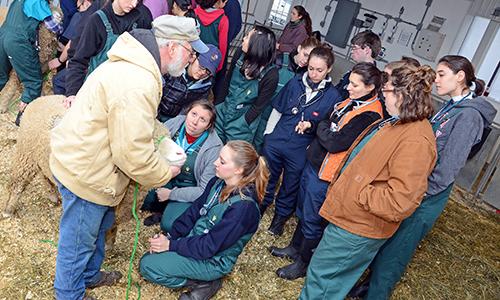-
About
- Leadership & Faculty
- News & Events
-
Admissions
-
Academics
- Graduate
- Advanced Clinical Training
- Continuing Education
- Academic Departments
- Academic Offices
- Simulation Experiences
-
Student Life
- Offices
-
Research
-
- Research
- Centers & Shared Resources
-
-
Hospitals & Clinics
- Emergency Care
- Hospital Services
-
Community Outreach
- Volunteer
D.V.M. Program
Apply Now
Get started or continue with your online application. For more information on Admissions Criteria, please visit the DVM Admissions page.
What does it mean to receive your D.V.M. degree from Cummings School of Veterinary Medicine?
On completing your D.V.M. degree at Cummings School through either the Legacy Curriculum or the New Curriculum, you will enter the profession with a strong understanding of the scientific and comparative basis of health and disease, and with advanced skills in clinical reasoning and clinical practice. You will possess the knowledge, ability, skills, and attitudes to promote the health of individual animals, of populations, and of society, across a spectrum of care. You will be well-prepared to pursue the myriad of career opportunities available in veterinary.
The D.V.M. program, built on a foundation of multi-species comparative medicine, incorporates different ways to learn and consider clinical, population health, and research problems, all in a One Health context. At the same time, the program is structured so that you will have the opportunity to pursue and build knowledge and expertise in your area of primary interest.
You will acquire the knowledge and develop the skills to be an independent learner, a problem solver, a critical thinker, a professional, and a technically proficient clinician. You will learn to be a confident, collaborative, and compassionate communicator, the key to success in any veterinary career.
You will have the resiliency and the intellectual curiosity needed to navigate the challenges of a rapidly changing world and to meet professional and societal expectations. You will be a lifetime member of the Cummings School Community. Join us in healing animals, helping people, and changing lives.
When you graduate from Cummings School, you will be able to:
- Assess health and disease of animals and populations.
- Utilize clinical reasoning to devise a differential diagnosis and treatment plan.
- Perform basic clinical procedures and treatments competently and confidently.
- Apply critical thinking, problem-solving, and research skills to questions ranging in scale from the case-specific to the global level.
- Effectively communicate and collaborate with the healthcare team, diverse clientele, community partners, lay public, and other stakeholders.
- Understand and exhibit professional and ethical conduct.
- Contribute to a community that values and fosters diversity, equity, inclusion, justice, and access (DEIJA). Recognize and address challenges when they arise.
- Apply financial and business knowledge, skills, and attitudes to support the full spectrum of veterinary care and diversity of careers within the veterinary field.
- Demonstrate enthusiasm to continue learning through identifying, critically assessing, integrating, and sharing knowledge and research.
- Engage with civic responsibilities and commit to social justice, recognizing the interconnectivity of animals, people, and the environment.
- Display resiliency in the face of challenges that arise within the profession and life
Employment, Salary, and Debt Data
Employment
At the time of their graduation in 2025, nearly 90% of our DVM students reported having secured a job or planned to continue their education. Over the last five years, this percentage has ranged from 89.4% to 100%.
Since 2020, within one year of graduation, between 94.2% and 100% of our alumni report having secured a position in the field of veterinary medicine.
Salary
On graduation, the median salary range for our students directly entering the veterinary workforce was between $130,000 and $140,000 in 2025. According to AVMA data, the average salary for new graduates across the US in 2024 was $125,500.
Debt
In 2024, the mean education debt for graduating DVM students from Tufts University was $146,404. The mean educational debt of all graduates from U.S. colleges of veterinary medicine was $161,803 in 2024 (see the AAVMC<https://www.aavmc.org/wp-content/uploads/2025/05/2025-AAVMC-Annual-Data-Report-Final.pdf> data for more information)
Curriculum Digests
Programs and Opportunities

Dual Degrees
Dual degree programs are open to D.V.M. students who wish to focus their training in research, public health, or laboratory animal medicine beyond the basic training in these areas in the D.V.M. program.

Signature Opportunities
Cummings School of Veterinary Medicine has differentiated itself from other veterinary schools and colleges by developing special signature opportunities, programs with depth and relevance to the future of veterinary medicine.

Unique Opportunities
We offer a unique opportunity for students to design their D.V.M. thus setting it apart from other veterinary schools. Cummings School offers special programs with sophistication and applicability to the future of the veterinary profession.
Explore our virtual tour and discover our campus
Campus Life

When our students have time to take a break from their studies, they enjoy life on campus. Spread across 594-acres, there are various places to relax in nature: a working farm, soccer field, dog park, bocce ball, volleyball and basketball courts, pickleball, and picnic areas.
What makes Worcester a Great Place?
Central Massachusetts has a lot to offer. Location. Convenience. Variety. Find out what’s to love about Worcester.
Career Opportunities
Career opportunities for veterinarians abound and go well beyond the companion animal health care provider that comes initially to mind. Veterinarians provide medical care for companion animals, food- and fiber-producing animals, horses, exotic animals, captive aquatic animals, wildlife species and laboratory research animals. In addition to primary clinical care, veterinarians engage in biomedical research and pathology and participate in protection of the public health both in the United States and abroad. It is truly a diverse profession.
Contact
For additional information or questions about the D.V.M. program, please contact the Office of Admissions:
Office of Admissions
Cummings School of Veterinary Medicine at Tufts University
200 Westboro Road
North Grafton, MA 01536
Phone: (508) 839-7920
Fax: (508) 887-4820
vetadmissions@tufts.edu